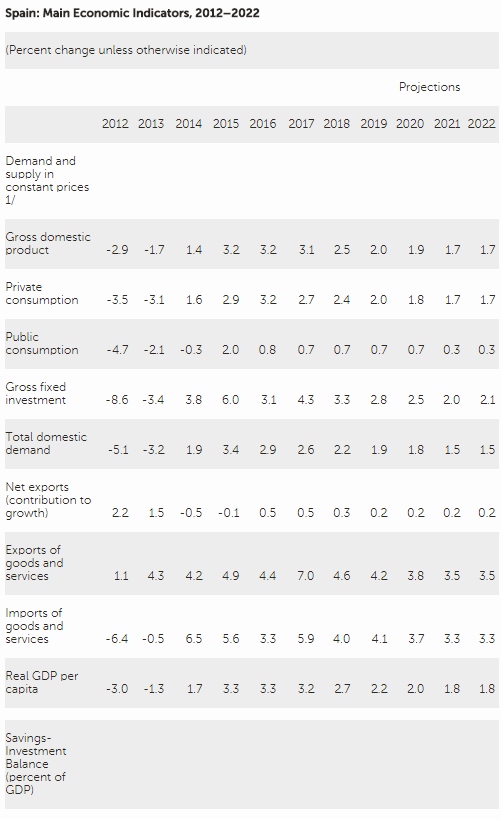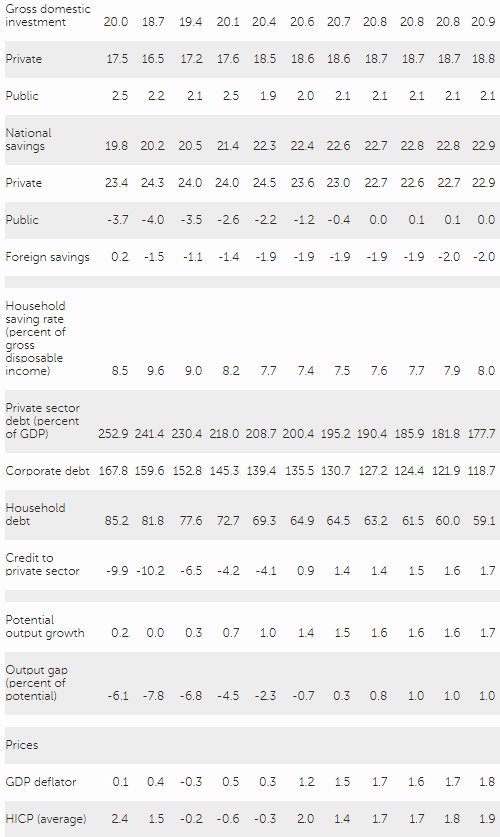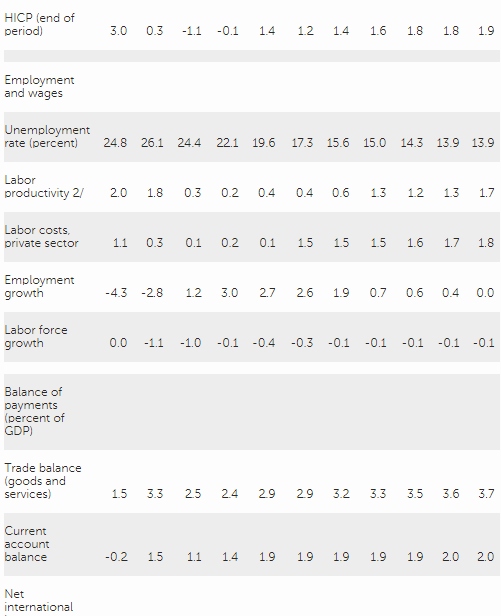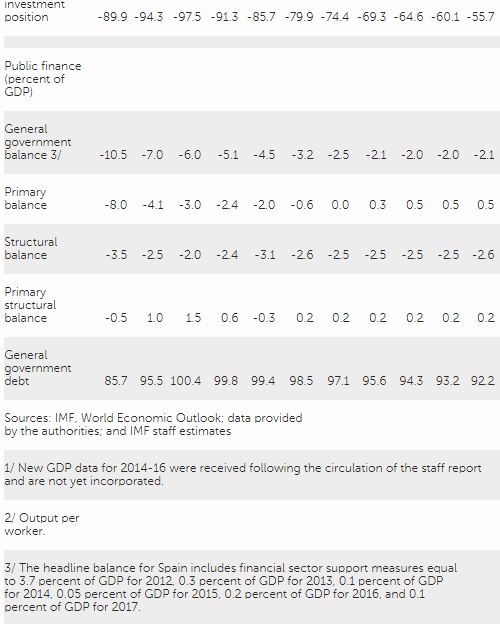IMF Executive Board Concludes 2017 Article IV Consultation with Spain
On September 20, 2017, the Executive Board of the International Monetary Fund (IMF) concluded the Article IV consultation with Spain. This also included a discussion of the Financial System Stability Assessment, based on the work of the Financial Sector Assessment Program (FSAP) missions.
Strong, balanced, and employment-intensive expansion of the Spanish economy continued during the first half of 2017, and the recovery reached a significant milestone when real GDP surpassed its pre-crisis peak. The economy grew by 3.3 percent in 2016 and is expected to expand by 3.1 percent this year. Past structural reforms, wage moderation and resulting cost competitiveness gains, favorable monetary and external conditions, and fiscal relaxation have provided impetus to the recovery. As some external tailwinds dissipate, economic activity is projected to moderate to 2.5 percent in 2018 in the absence of any major boost in productivity growth.
A shift in resources toward the competitive export sector, with the services sector creating most new jobs, has played an important part in the economic rebound. Unemployment dropped to its lowest level in seven years, but at 17.2 percent the rate is still among the highest in Europe, with significant shares of youth and long-term unemployment and amid widespread labor market duality. The current account recorded its fourth consecutive annual surplus in 2016—a trend that is expected to continue in the medium term. Nevertheless, Spain’s net debtor position with the rest of the world is still large. Headline inflation increased earlier this year due to higher energy prices, but is gradually converging towards core inflation, which has remained below 1.4 percent so far in 2017. Public debt is close to 100 percent of GDP, while population aging is contributing to fiscal pressures.
The banking system has become more resilient since the last FSAP. It has strengthened its solvency and continued to reduce nonperforming loans (NPLs) for business in Spain to 8.4 percent of total loans at end-June 2017. Nevertheless, NPLs remain especially elevated for some sectors. At the same time, private sector deleveraging has reduced the debt-to-GDP ratio by 70 percentage points from its pre-crisis peak to end-2016. Banking system profitability, though higher than the euro area average, declined and remains a challenge in the environment of low interest rates, high legacy problem assets, and continued excess capacity. Systemic interconnections of the financial system are on the rise with cross-sectoral and cross-border claims picking up.
Executive Board Assessment
Executive Directors welcomed Spain’s continued strong and balanced growth, accompanied by healthy job creation, which highlight the contribution of past structural reforms to making the economy more competitive, flexible and resilient. Nonetheless, Directors noted that structural weaknesses persist, vulnerabilities have not been fully overcome, and the unemployment rate remains high while productivity lags EU peers. In addition, public and private sector balance sheets remain vulnerable to shocks. With this backdrop, Directors recommended gradual fiscal tightening. They also underscored the need to preserve and deepen reforms, including steps to reduce structural unemployment, strengthen the business environment and competition, and make the financial sector more resilient along the lines of recommendations in the Financial Sector Stability Assessment (FSSA).
Directors welcomed the return to structural fiscal consolidation in 2017. Given the limited fiscal space and supportive cycle, Directors encouraged the authorities to maintain the current pace of adjustment until structural balance is reached. They noted that room lies mostly on the revenue side, including gradually reducing the number of goods and services that qualify for reduced VAT rates, reducing tax system inefficiencies, and raising environmental taxes, while adequately shielding vulnerable groups. Directors noted the importance of applying the expenditure rule and measures to increase expenditure efficiency. To alleviate age‑related spending pressures, Directors called for full implementation of ongoing pension reforms and public disclosure of reform tradeoffs to support workers’ retirement planning.
Notwithstanding strong employment creation, Directors stressed the need for further actions to reduce high structural unemployment. To this end, Directors called for a holistic approach, including improvements in the quality of education and training which would also reduce the risk of poverty and exclusion among vulnerable groups. Maintaining competitiveness would be critical for sustaining employment gains. Directors emphasized that well‑designed and targeted active labor market polices, along with enhanced performance of the Public Employment Services, could help low‑skilled youth and the long‑term unemployed to return to work. Further efforts are also needed to reduce labor market segmentation.
Directors stressed the need to accelerate competition‑enhancing reforms to boost growth prospects. They emphasized the need to fully implement the Market Unity Law, jumpstart the liberalization of professional services, ease access to equity financing for startups, and make public research and development spending more efficient. Directors welcomed efforts to minimize regulation‑induced disincentives for firm growth.
Directors commended the significant progress made in strengthening banking sector soundness, as reflected in the FSSA. They welcomed plans to enhance and modernize the financial sector institutional set‑up and strengthen the cooperative sector. Recognizing remaining weaknesses and legacy issues, Directors encouraged the authorities to accelerate bank balance sheet cleanup, including through ambitious NPL reduction. Directors underscored the importance for banks to further raise high‑quality capital and reduce operating costs to improve profitability and enhance resilience. Directors also called for rigorous monitoring of interest rate and bond market risks, and stressed the need for greater focus on contagion risk within the financial system and cross‑border spillovers. The macroprudential toolkit should be expanded to strengthen the ability to deal with build‑up of systemic risks. Establishing a systemic risk council would augment the capacity for risk oversight, policy coordination and crisis prevention.




Source: International Monetary Fund
- 305 reads
Human Rights
Fostering a More Humane World: The 28th Eurasian Economic Summi

Conscience, Hope, and Action: Keys to Global Peace and Sustainability

Ringing FOWPAL’s Peace Bell for the World:Nobel Peace Prize Laureates’ Visions and Actions

Protecting the World’s Cultural Diversity for a Sustainable Future

Puppet Show I International Friendship Day 2020

